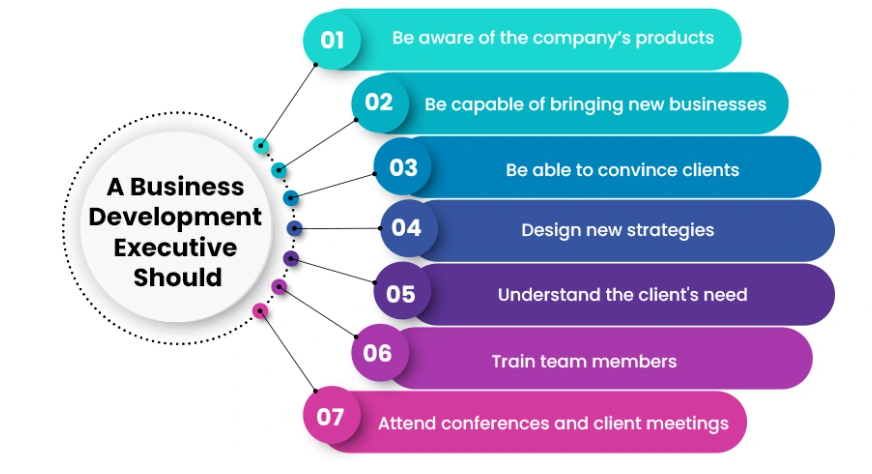In today’s competitive business landscape, companies are constantly seeking ways to grow, expand, and stay ahead of the curve. One of the key roles responsible for driving this growth is the Business Development Executive (BDE). But what exactly does a Business Development Executive do, and why is this role so critical to an organization’s success? In this article, we’ll explore the responsibilities, skills, and importance of a Business Development Executive, along with answering some frequently asked questions.
What is a Business Development Executive?
A Business Development Executive is a professional responsible for identifying new business opportunities, building relationships with potential clients, and driving revenue growth for an organization. They act as the bridge between a company and its customers, ensuring that the company’s products or services meet market demands. Their primary goal is to generate leads, close deals, and foster long-term partnerships that contribute to the company’s growth.
Key Responsibilities of a Business Development Executive
The role of a Business Development Executive is multifaceted and varies depending on the industry and company size. However, some common responsibilities include:

- Identifying New Opportunities: Researching and identifying potential markets, clients, and partnerships to expand the business.
- Lead Generation: Prospecting and generating leads through cold calling, networking, and digital marketing strategies.
- Client Relationship Management: Building and maintaining strong relationships with existing and potential clients.
- Sales Strategy Development: Creating and implementing strategies to achieve sales targets and revenue goals.
- Market Research: Analyzing market trends, competitor activities, and customer needs to stay ahead of the competition.
- Negotiation and Closing Deals: Negotiating contracts and closing deals to ensure profitability.
- Collaboration: Working closely with marketing, product development, and sales teams to align business goals.
- Reporting: Tracking and reporting on sales performance, market insights, and business development activities.
Skills Required to Become a Successful Business Development Executive
To excel in this role, a Business Development Executive must possess a combination of hard and soft skills, including:
- Communication Skills: Excellent verbal and written communication skills to effectively pitch ideas and negotiate deals.
- Sales Acumen: A strong understanding of sales principles and the ability to close deals.
- Strategic Thinking: The ability to develop and implement long-term business strategies.
- Networking Skills: Building and maintaining relationships with clients, partners, and industry professionals.
- Analytical Skills: Analyzing data and market trends to make informed decisions.
- Adaptability: Thriving in a fast-paced, ever-changing business environment.
- Time Management: Prioritizing tasks and meeting deadlines efficiently.
Why is a Business Development Executive Important?
A Business Development Executive plays a crucial role in the growth and success of an organization. Here’s why:
- Revenue Growth: By identifying new opportunities and closing deals, they directly contribute to the company’s revenue.
- Market Expansion: They help the company enter new markets and reach a wider audience.
- Client Retention: By building strong relationships, they ensure customer loyalty and repeat business.
- Competitive Advantage: Their insights into market trends and competitor activities help the company stay ahead.
- Innovation: They often bring fresh ideas and strategies to the table, driving innovation within the organization.
FAQs About Business Development Executives
1. What is the difference between a Business Development Executive and a Sales Executive?
While both roles focus on generating revenue, a Business Development Executive is more focused on identifying new opportunities and building long-term relationships, whereas a Sales Executive is primarily responsible for closing deals and meeting sales targets.
2. What qualifications are needed to become a Business Development Executive?
Most companies require a bachelor’s degree in business, marketing, or a related field. However, experience in sales, marketing, or business development is often more important than formal education.
3. What industries hire Business Development Executives?
Business Development Executives are needed in almost every industry, including technology, healthcare, finance, retail, and manufacturing.
4. What is the career progression for a Business Development Executive?
With experience, a Business Development Executive can advance to roles such as Business Development Manager, Director of Business Development, or even Vice President of Business Development.
5. How do Business Development Executives generate leads?
They use a variety of methods, including cold calling, email marketing, social media outreach, networking events, and referrals.
6. What tools do Business Development Executives use?
Common tools include Customer Relationship Management (CRM) software, email marketing platforms, LinkedIn, and market research tools.
7. Is a Business Development Executive role stressful?
The role can be demanding due to the pressure to meet sales targets and the need to constantly identify new opportunities. However, it can also be highly rewarding for those who thrive in dynamic environments.
Closing
A Business Development Executive is a vital asset to any organization, driving growth, fostering relationships, and ensuring long-term success. With the right skills, mindset, and strategies, they can unlock new opportunities and take a company to new heights. Whether you’re considering a career in business development or looking to hire a BDE for your organization, understanding the role’s importance and responsibilities is key to achieving your goals.


